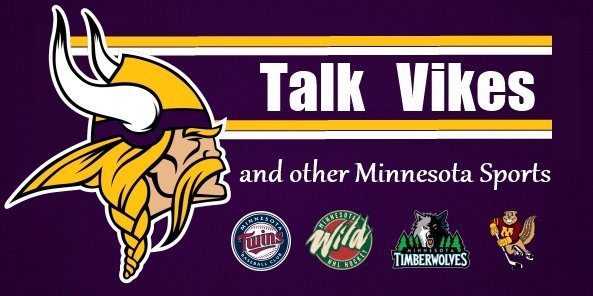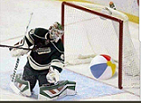SoMnFan
Posts: 94902
Status: offline

|
On the surface, the coaching battle in the Stanley Cup finals between the Tampa Bay Lightning and Chicago Blackhawks could hardly be waged between two more disparate characters.
Lightning coach Jon Cooper never played a hockey game at a meaningful level, although he played NCAA lacrosse for four years (scoring 74 goals) and played on Hofstra University’s club hockey team.
A former defense attorney, Cooper has seen his coaching career arc sharply. In less than 10 years, he has gone from the United States Hockey League to within four games of a Stanley Cup ring.
Blackhawks head coach Joel Quenneville, meanwhile, is a hockey lifer.
The Windsor, Ontario, native played 803 NHL games as a stay-at-home defenseman and never bothered to take his skates off when he transitioned into coaching, serving as a player/coach for the AHL St. John’s Maple Leafs in 1991-92.
Marc Crawford was the head coach of that team and recalled one night when they decided to go with 11 forwards and five defensemen. Quenneville came into Crawford’s office huffing and puffing.
“That’s the last [bleeping] time we go 11 and 5,” Quenneville wheezed.
Crawford laughs at the memory, wondering whether Quenneville thinks of that night when he routinely sends Duncan Keith or Niklas Hjalmarsson over the boards for 30 minutes a night.
Quenneville moved steadily through the NHL coaching ranks first as an assistant with Crawford in Quebec and then when the team moved to Colorado, where he won a Cup in 1996. His first head-coaching job was with the St. Louis Blues. Then he made a stop in Colorado before his current job with the dynastic Blackhawks.
The differences between the two coaches would seem on the surface to be pronounced.
Quenneville is by nature more closed and private. In his meetings with reporters, he gives little away other than the occasional twinkle in his eye or wry grin.
“I can’t say enough about Joel as a person. He’s a great guy,” Crawford told ESPN.com. “I think far too little is given to that part of it. When they’re just good people that’s probably 70 or 80 percent of what makes coaches special.”
Most often when you see a head coach talking to his assistant on the bench he’s asking “what just happened?” on a particular play, Crawford said.
Not so much Quenneville.
“He has unbelievable vision on the bench to see the game,” Crawford said. “It’s remarkable, it’s like he actually has a videotape in his mind. That’s such a valuable tool to be able to see the game.”
As for recognition and accolades -- Quenneville has one Jack Adams Trophy as coach of the year in 2000 and was runner-up in 2013 -- it’s not something that Quenneville seems concerned about.
Crawford believes that within the coaching fraternity there is high regard for the job Quenneville has done, but outside the fraternity probably less than he deserves: “But he doesn’t seek it either. Joel’s pretty private.”
Those who know him, though, know him as a gregarious, fun-loving man who enjoys a game of golf, a cold beer or a day with the ponies at the track.
“He’s a guy’s guy,” Crawford said.
Everything about Cooper and his path to convergence with Quenneville speaks of something different.
After obtaining his law degree and practicing as a criminal defense attorney, Cooper took a job as head coach in the North American Hockey League with St. Louis. Former NHLer Kelly Chase knew of Cooper through mutual friend and former NHLer Wendel Clark.
Chase credits Cooper for helping lay the foundation for multiple championships for the team.
One time some of the younger players got into some beer, and a billet family called the team about the incident. Instead of reading the players the riot act, Cooper told the team’s leadership core what happened. Then he sat the rookies on the bench while he skated the veteran players until they were ready to drop -- the implication being that the veterans would make their displeasure abundantly clear to the younger players.
“He didn’t even talk to the younger players about it,” Chase recalled.
Cooper admits that he approaches things differently having taken a nontraditional route.
“You have to learn from people. ... I pull things from everybody and try to mold them to my personality,” Cooper said. "But to hear other coaches, and I’ve talked to basketball, football, lacrosse, hockey and all different sports because I just don’t feel like you can sit in one sport and say ‘oh that’s who you’re learning from.’ I go to other avenues, and they’re a wealth of knowledge.”
The Prince George, British Columbia, native insisted he has not changed his style or his beliefs about what makes a good coach even when having to overcome the stigma of not being a “hockey guy.”
“You’ve got to go through with your beliefs, and I did that,” Cooper said.
“In looking at whether I played or didn’t play in the game, I had to fight through that. But ultimately nobody really cares if you win. It erases all. Your street cred comes when you win, and everything else is erased. Now people would probably look at me and not have any clue if I played or not.”
Detroit Red Wings prospect Nick Jensen played two seasons under Cooper in Green Bay of the United States Hockey League. He ranks playing for Cooper among his fondest hockey memories.
“In terms of coaching style, he’s probably the best coach I’ve had,” said Jensen, who is now with the Grand Rapids Griffins in the AHL. “Just the way he communicates with his players.”
Tampa Bay defenseman Jason Garrison said Cooper’s upbeat attitude has been a welcome tonic for a team that lacks the playoff experience of other teams they’ve come up against this spring.
“He brings a lot of good energy,” Garrison said. “He’s very social with the guys. Gets to know everybody pretty well. And he’s calm. And I think for a team like we have it’s really good, and it wears off on the guys. Even though the guys are super competitive, don’t want to make mistakes, everyone knows when you make a mistake, and it’s just that Coop’s really good at it, he lets you know but you don’t lose confidence doing it.”
Chase said he was not surprised at Cooper’s meteoric rise through the coaching ranks.
“Coop’s the kind of guy who could talk to the president, the pope or a pimp, and he’d be comfortable talking to each of them, he’s just got that kind of swagger,” Chase said.
That sentiment is echoed by Cooper’s old lacrosse coach John Danowski.
“He was extremely bright. He was extremely intelligent,” Danowski told ESPN.com.
“He was really at ease socially. People wanted to be around him. He made everybody feel comfortable around him. He was somebody who had this aura or this personality that just made you relax and be yourself.”
In spite of their disparate paths to the top of the game, there are many similarities between Cooper and Quenneville.
Lots of coaches can “coach up,” Chase said, that is, get more out of less talented players through motivation and systems work. But it takes a special coach to get maximum production from talented players.
To manage egos and distribute ice time equitably and keep good players competitive is a different skill set, and both of these teams have those qualities, Chase said.
“In my opinion, Joel’s the best coach in the National Hockey League,” said Chase, who played for Quenneville in St. Louis.
“For me, the greatest trait about him was I knew what my role was, and he never questioned my role. He trusted my judgment was good enough to handle the situation. That was how he was with all his players.”
In the current NHL landscape, it seems a coach is either a “players’ coach” or a hard line, go-to-the-whip coach.
“I would say Joel’s a hybrid,” said Rick Dudley, a longtime player, coach, scout and general manager who was with the Blackhawks organization when Quenneville was named head coach.
“It’s a very difficult line to straddle, but he does it well.”
The players know they’re going to be prepared to play, and while he’s not soft on them, neither is he outrageously hard on them.
“A lot of coaches are hard on players all the time. Those coaches have a shelf life,” Dudley said. It works when you win, but you lose the ear of the room when you lose, he said.
Quenneville’s longevity with the Blackhawks is a testament to finding a happy medium in coaching styles.
“They [the players] have to respect you, but they also have to care about you a little bit,” Dudley said.
Chicago GM Stan Bowman has provided Quenneville with a banquet of talent, and the coach has made the most of it, winning two Stanley Cups and advancing to at least the conference finals five times since 2009.
“I think he has an understanding of how to maximize his talent,” Bowman said.
“If you look at our team, the strength of our team is really the skill level and the dynamic offensive part of it. So I think he’s been able to maximize that. Even though it’s not necessarily maybe what he was like as a player or even the kind of style that maybe he would gravitate towards, but I think that’s what good coaches can do.”
There are some absolutes with Quenneville in how players must play, Bowman said. But if players accept those responsibilities, there is also tremendous freedom for them to create.
“I think our players really respect him because he’s got a very cordial relationship with them, but he’s not really in their face a whole lot. ... He’s not their buddy,” Bowman said.
And if he tried to be their buddy, it wouldn’t be Quenneville.
“I think there's always that comfort you feel in knowing what to expect with a certain coach because you played for him for a number of years,” Blackhawks captain Jonathan Toews said.
“I think as we've gone on, like I've said, that level of understanding there between the guys that have been around him, played for him for a number of years, we just kind of go with the flow, we all know how things are going to be handled from a player and coach standpoint, win or lose, in some of these important games late in the postseason like this.”
How does Quenneville view his own evolution?
“Well, whether it's balanced or not, I think being yourself is probably being part of it,” Quenneville said.
“Challenging your team, holding them accountable, being consistent, lines of communication being open and direct. That's something we try to be consistent at. But I think it's really been a good experience in Chicago coaching this group because you know the leadership and consistency of the team's demeanor. How we've come to play every single game is reinforced by how the top guys come to play.”
We are down to the thin edge of the wedge now. Two teams trying to score four victories before the other. Two coaches trying to map out a plan, come up with a lineup that will give them the best chance to win that race to four.
It matters not the path that brought them to this crossroads but now just who crosses that finish line first.
Burnside, ESPN
_____________________________
Work like a Captain.
Play like a Pirate.
|

 Printable Version
Printable Version















 New Messages
New Messages No New Messages
No New Messages Hot Topic w/ New Messages
Hot Topic w/ New Messages Hot Topic w/o New Messages
Hot Topic w/o New Messages Locked w/ New Messages
Locked w/ New Messages Locked w/o New Messages
Locked w/o New Messages Post New Thread
Post New Thread